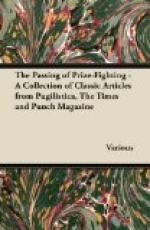[Illustration: The Corsican Brothers and Nance Oldfield at the Lyceum.]
When some years ago the Irvingesque version of it was produced, the twin who lived in Corsica, Brother Fabien, used to behave in the wildest Corsican way. Who that saw it some years ago does not remember how he used to chuck his gun up in the air, when it caught on to a hook in the wall! with what gusto he used to light a tiny cigarette from an enormous flaming brand snatched from the burning wood fire on the hearth! and how badly the starving guest from Paris fared in the Corsican household where he hadn’t a chance against the appetite of Master Fabien, who, after a hard day’s sport, came in ready for anything, and ate everything! It was the only occasion when this fearless son of destiny ever “bolted.” But, my! how the food used to disappear! what a short time the supper occupied, and how very much third best the poor stranger came off under the hospitable roof of the Dei Franchis. Even now the supper is a brief one, but justice is done to it, and to the weary traveller. Never was such an unhappy tourist! He comes to a house in the wilds of Corsica; he is choke-full of Parisian gossip, he has a lot to say of course, but he never gets a chance, as Fabien tells him family stories one after the other, as if he hadn’t had such an opportunity or so good a listener for ever so long. Then, when on the entrance of his mother Fabien breaks off in the middle of one of his many anecdotes, which evidently can’t be told before ladies, the Parisian gent, who now sees something like an opening for some light Boulevardian chit-chat, is presented with a flat candlestick and bowed off to bed, without being allowed a word to say for himself. All this is just the same as ever; there have been no alterations nor repairs; the piece is as curiously old-fashioned as are the exquisitely correct costumes; while the Masked Ball at the Opera and the Duel in the snow are as effective as ever, and the latter, if anything, more so. They make a first-rate fight of it, do Messrs. Irving dei Franchi and M. Terriss de Chateau Renaud, until the latter collapses, and “subsequent proceedings interested him no more.” As long as the strong right arm of the Corsican Brother can draw a good and shining rapier, he will draw as good and brilliant a house as he did on the first night of this revival. Why ought this piece to go well in the first theatre in Ireland? Why? because it’s a great play for Doublin’. Exeunt omnes.
* * * * *
THE EPIDEMIC.—Up to now Members of Parliament have been generally considered as “influential personages.” This year many M.P.’s will be remembered as “very influenzial personages.”
* * * * *
[Illustration: THE MOST IRRESISTIBLE SIRENS ARE NOT THOSE WHO SING, BUT THOSE WHO LISTEN (OR PRETEND TO)!




